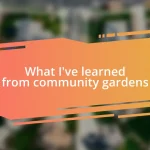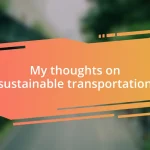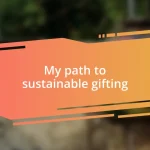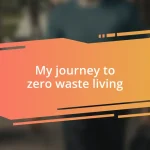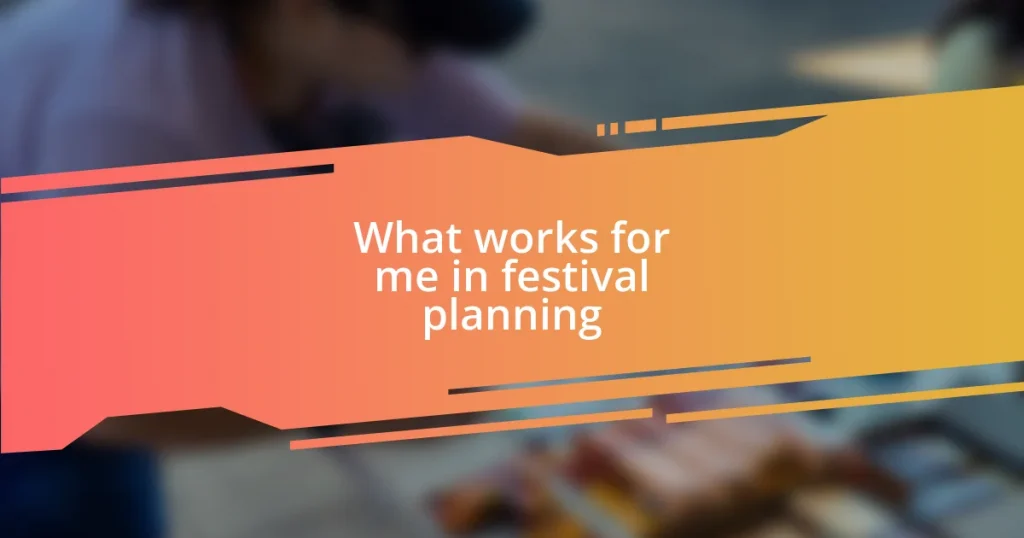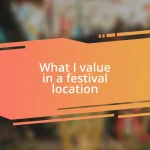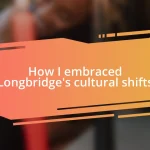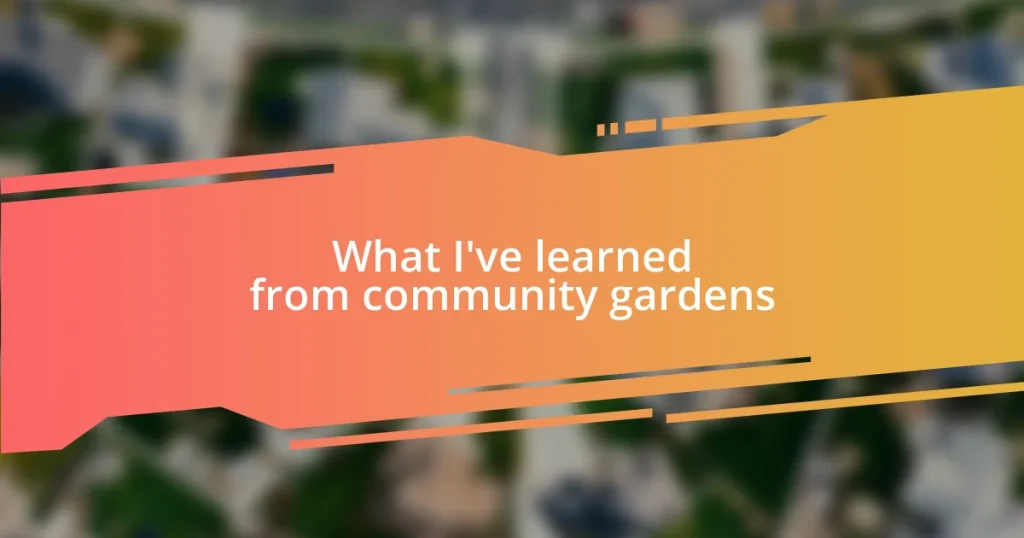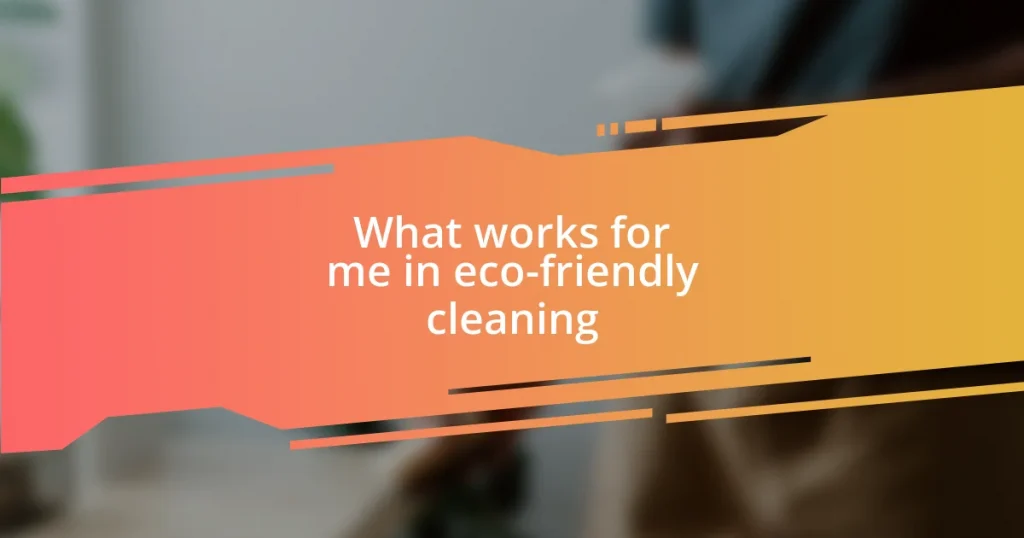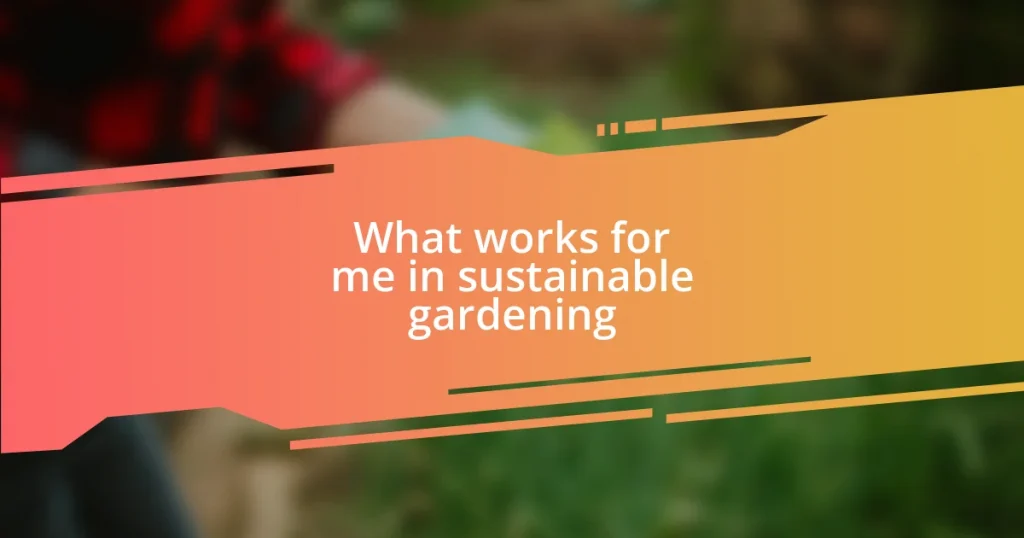Key takeaways:
- Creating a unique experience and engaging the community is essential for memorable festivals.
- Setting clear, measurable objectives and being adaptable during the planning process enhances event outcomes.
- Post-festival evaluation through feedback and data analysis informs future planning and allows for emotional connections with attendees.
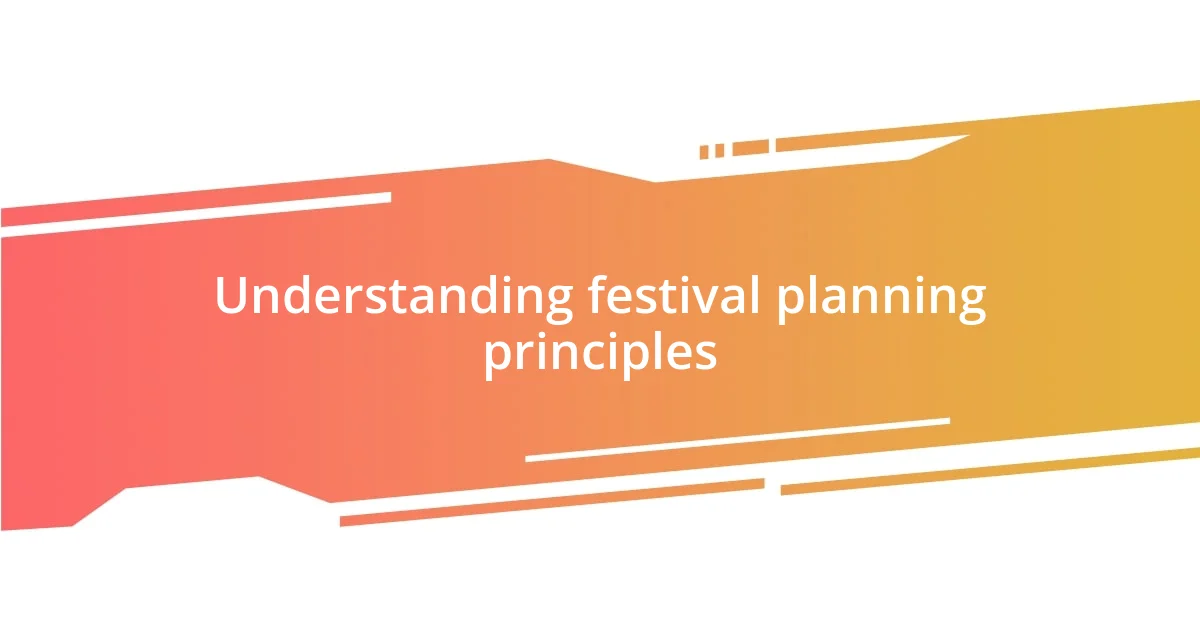
Understanding festival planning principles
When diving into festival planning, I often reflect on what makes an event truly memorable. From my experience, understanding the core principles—like audience engagement, logistics, and budgeting—is key. Have you ever wondered why some festivals feel so alive while others fall flat? It usually boils down to how well the planners grasp these fundamental elements.
One principle I cherish is the importance of creating a unique experience. I recall attending a small local music festival where the planners organized activities that reflected the community’s culture—food vendors offering local dishes and artists showcasing regional talent. This thoughtful approach not only drew in crowds but also fostered a sense of connection. Isn’t it special when a festival celebrates its roots?
Furthermore, adaptability is crucial in this field. I’ve learned that even the best-laid plans can change overnight, like when unexpected weather forces you to rethink an outdoor stage. It’s moments like these that test your creativity and problem-solving skills. How would you handle a sudden downpour? Embracing flexibility in your planning can turn potential setbacks into opportunities for innovation.
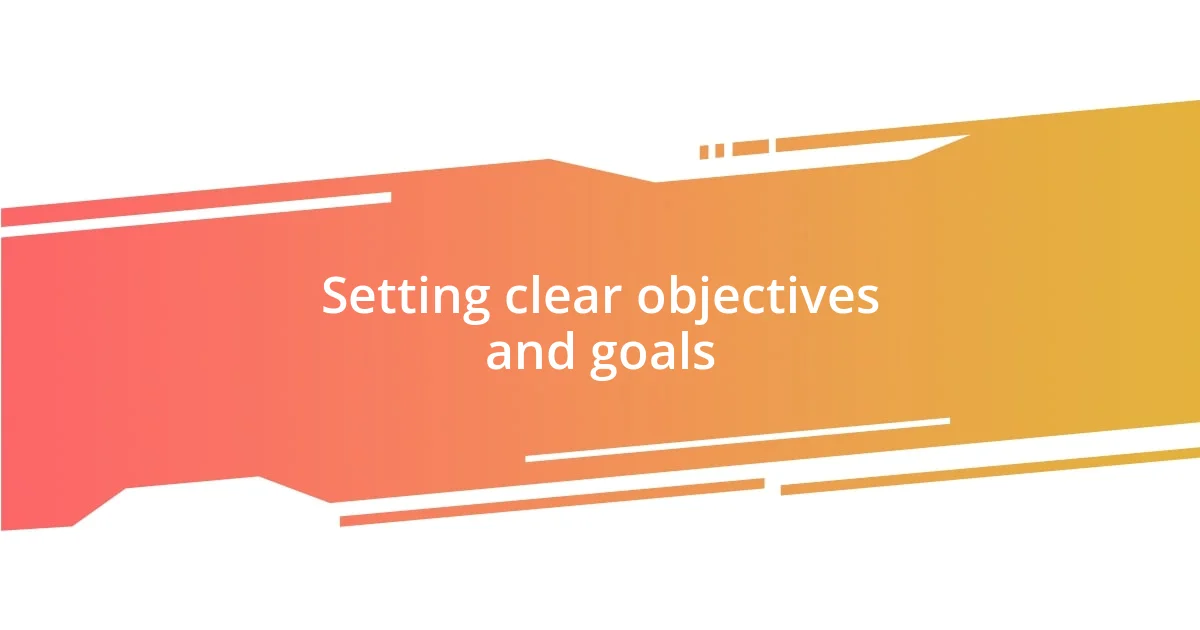
Setting clear objectives and goals
Setting clear objectives and goals is essential in festival planning. From my journey in organizing events, I’ve found that having defined goals helps maintain focus throughout the planning process. For instance, when I aimed to create a festival celebrating diversity, I set clear objectives for community involvement and representation. This clarity not only guided my decisions but also inspired our team to align with that vision.
As I worked on a recent arts festival, I learned the importance of specific, measurable goals. We decided to track attendance growth, artist participation, and audience satisfaction through feedback forms. This allowed us to see where we excelled and where we could improve in future events, making the experience more rewarding for everyone involved. Have you ever had a moment when a clear goal transformed the way you approached a project? I certainly have, and it can be a game-changer.
Another critical insight I want to share is the significance of adjusting goals as you progress. During one festival, we underestimated the time needed for setup, leading to a scramble on the first day. This experience taught me to be adaptable and ready to reassess objectives as situations evolve. Have you ever faced a similar challenge? In the realm of festival planning, being open to change can lead to even greater outcomes.
| Type of Goal | Example |
|---|---|
| Community Engagement | Encourage local participation in planning |
| Audience Growth | Increase attendance by 20% |
| Feedback Collection | Gather at least 100 participant surveys |
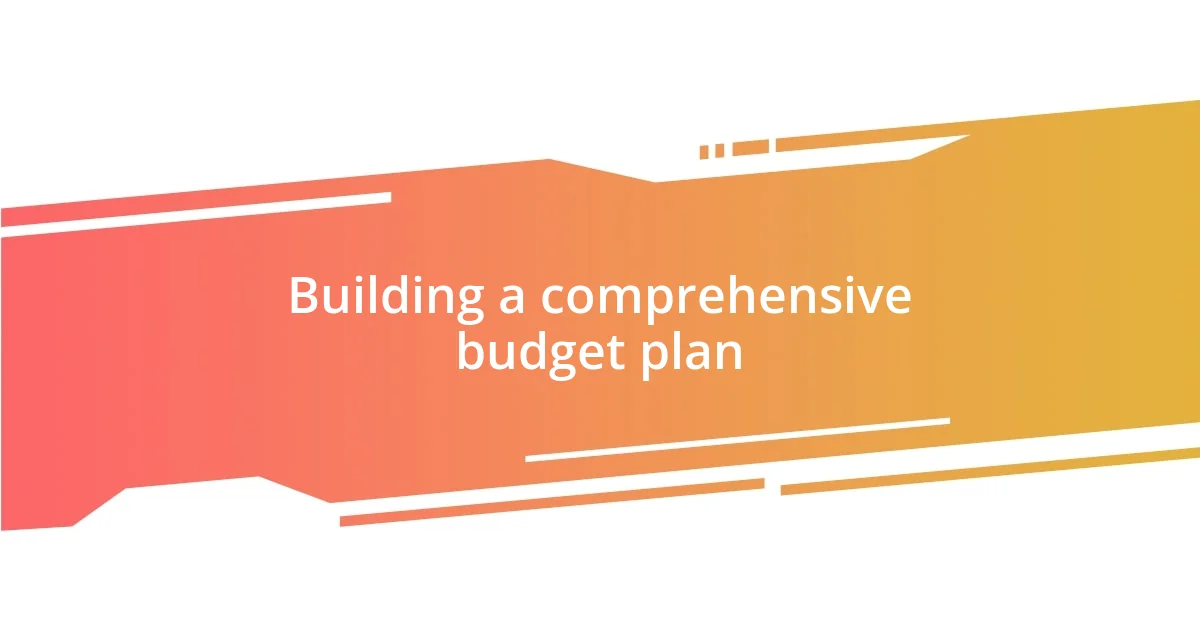
Building a comprehensive budget plan
Building a comprehensive budget plan isn’t just about numbers; it’s about putting your vision into a financially viable framework. I’ve experienced firsthand the stress that comes from inadequate budgeting. One time, after a successful first year of a food festival, I didn’t account for rising vendor costs in my second year. As a result, I had to scramble to secure more sponsorships last minute. That taught me the importance of anticipating potential changes in expenses.
To create a reliable budget, consider incorporating these key components:
- Income Sources: Identify where your revenue will come from—ticket sales, vendors, sponsorships, or grants.
- Cost Estimates: Break down expenses by category, including venue, permits, equipment rentals, and promotions.
- Contingency Fund: Set aside a percentage of your budget—around 10%—for unforeseen costs that may arise.
- Tracking Mechanism: Use spreadsheets or budgeting tools to monitor your finances throughout the planning process.
- Regular Reviews: Schedule regular budget reviews to adjust for any changes or surprises.
Taking the time to meticulously outline each area gives you a clearer picture, making it easier to stay on track. I remember a time when I implemented a budget review with my team weekly. This transparency in our finances not only helped us stay accountable to our goals, but it also sparked engaging discussions about where we could optimize spending. Isn’t it liberating to have clarity around your finances?
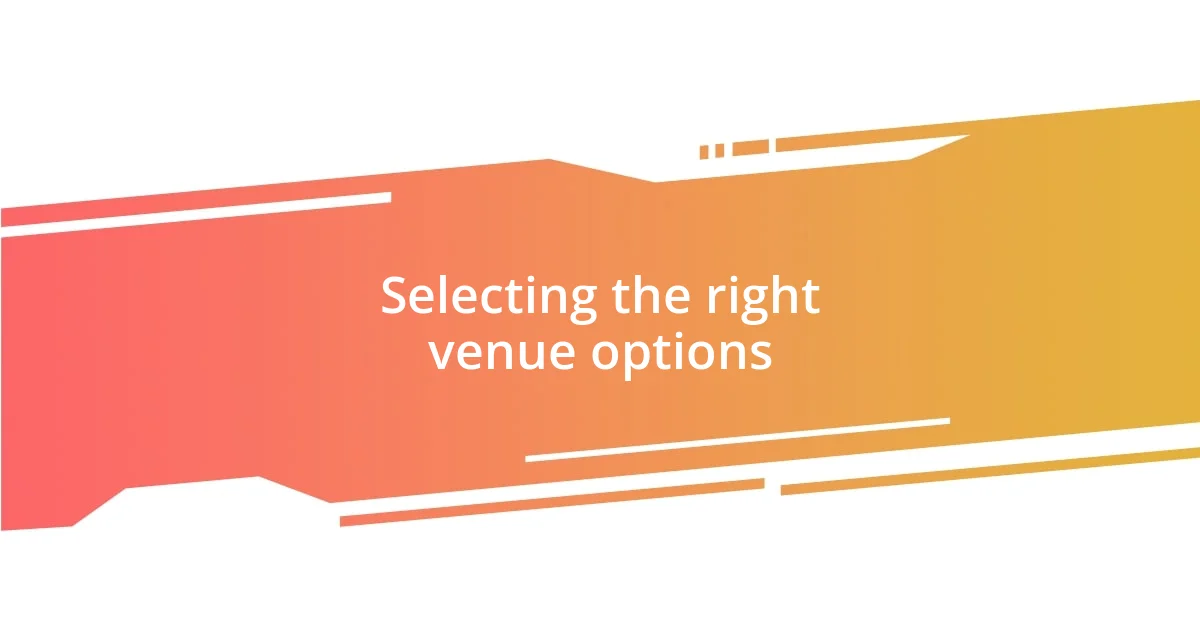
Selecting the right venue options
Selecting the right venue options can truly make or break a festival. I vividly recall the excitement of choosing a waterfront location for a summer music festival. The picturesque views were a huge draw for attendees, but we also discovered that transportation access and nearby amenities significantly influenced how people experienced the event. Have you noticed how the right setting can elevate an experience? It’s remarkable.
When I organized an outdoor arts festival, I quickly learned the importance of flexibility. We had initially planned at a spacious park, but weather concerns pushed us to a local indoor venue. While at first, I felt a pang of disappointment, the move allowed us to create an intimate atmosphere that fostered closer connections between artists and attendees. This taught me that assessing multiple venue options not just for capacity but for vibe can lead to unexpected benefits. Have you ever found a silver lining in an unplanned change?
Finally, considering the logistical aspects is equally vital. Parking, accessibility, and restroom facilities can affect both participant experience and operational efficiency. During one festival, I overlooked the importance of signage for directing attendees, and it resulted in confusion that dampened the overall mood. I realized then that it’s the small details that can create or break a seamless experience. Does this resonate with your own planning experiences? Understanding these nuances can greatly enhance the overall success of an event.
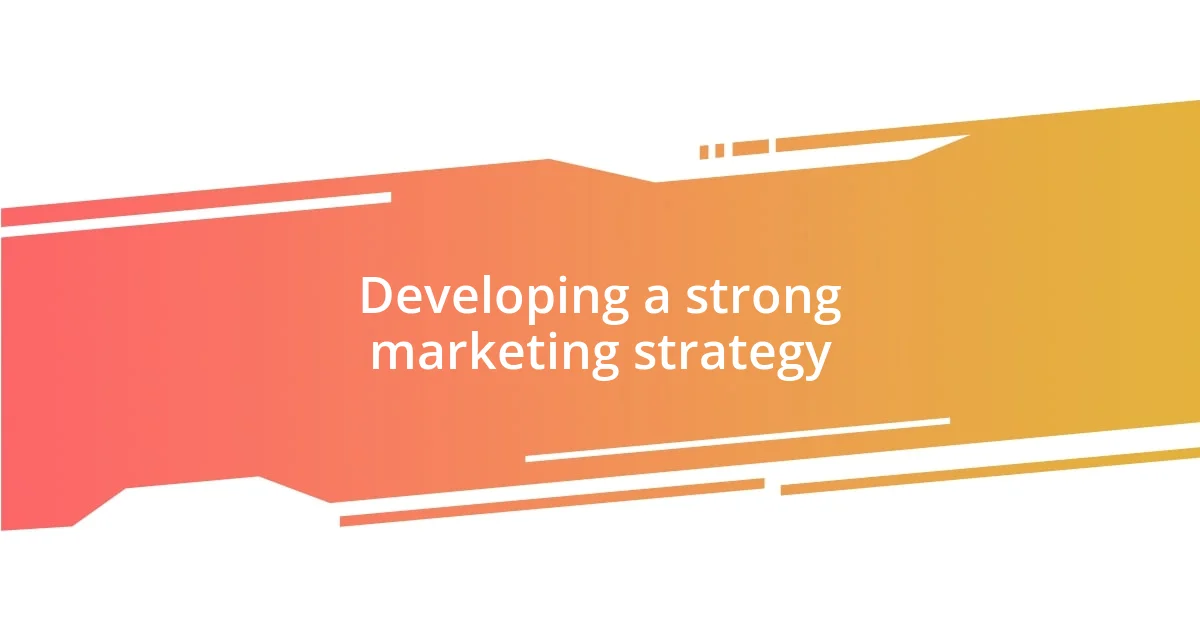
Developing a strong marketing strategy
Developing a strong marketing strategy is crucial in setting the tone for a successful festival. I remember organizing a food festival where we decided to utilize social media influencers to spread the word. Their authentic voices helped us reach a wider audience, and it was fascinating to see how genuine endorsements converted followers into ticket buyers. Have you considered how impactful authentic partnerships can be for your event?
One strategy that has really worked for me is segmenting my audience. By tailoring marketing messages for different groups—like families, students, or foodies—I’ve seen increased engagement. For instance, during a local arts festival, we created targeted content showcasing workshops for kids and food trucks for young adults. This focused approach not only boosted ticket sales but also made attendees feel catered to. Isn’t it rewarding when your audience feels like the event was made just for them?
Don’t underestimate the power of early bird promotions and engaging content leading up to your event. I’ve found that creating a buzz through sneak peeks, behind-the-scenes videos, or countdowns can generate excitement. For one festival, we filmed a series of short clips featuring our talented performers, which resonated with our audience. Watching their enthusiasm build was a joyful reminder of why I love festival planning. Have you found ways to build anticipation that resonates with your audience?
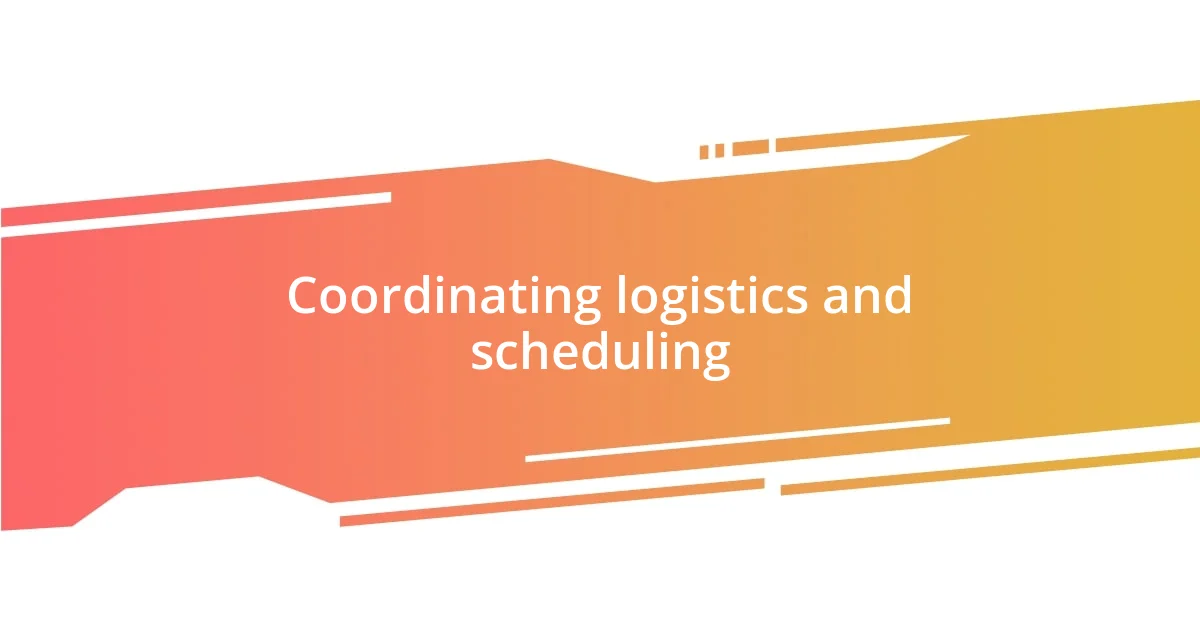
Coordinating logistics and scheduling
Coordinating logistics and scheduling is truly the backbone of festival planning. I’ve often found myself torn between prioritizing performer schedules and ensuring vendor setups are on time. For a community festival, I created a detailed timeline that included every little task, from sound checks to food truck arrivals. This meticulous planning paved the way for a smooth event day. Have you ever experienced the relief of seeing your schedule come together perfectly?
Scheduling also involves anticipating potential hiccups. During one festival, a last-minute performer cancellation threatened to throw us off balance. Instead of panicking, I quickly adjusted the schedule and brought forward a popular local band. The audience didn’t just enjoy the change; they loved it! This taught me the value of keeping alternative plans ready. How do you handle unexpected changes in your planning?
Moreover, the logistical side extends beyond just the daily schedule. I created checklists for every team member, simplifying communication and ensuring accountability. One time, I overlooked a crucial item—confirming transportation for a headliner. Thankfully, a quick call to a reliable service saved us, but I learned that even small details can have significant repercussions. Isn’t it fascinating how each element plays a role in the grand picture?
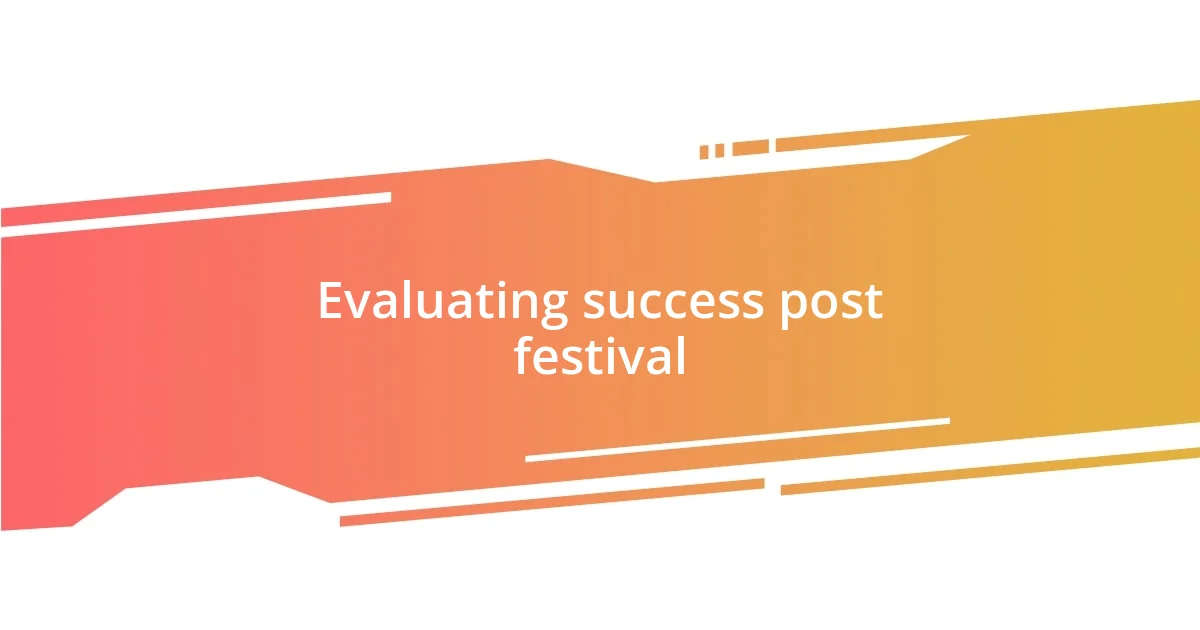
Evaluating success post festival
Evaluating success post-festival is a critical step for me. I find it essential to gather feedback from attendees, volunteers, and vendors to truly understand what went well and what didn’t. During one of my events, we handed out surveys and the responses were eye-opening; I had no idea that the food truck selection would be a highlight for so many. Does it surprise you how much attendees notice the little details?
I also believe in analyzing ticket sales and comparing them with our goals. In a recent festival, we aimed for a 20% increase in ticket sales compared to the previous year, and it was thrilling to see that we exceeded that target by 5%. Reflecting on these numbers not only boosts my confidence but also helps shape strategies for future events. Have you ever experienced that rush of success when data backs up your efforts?
Lastly, I can’t stress enough how important it is to gather emotional insights from participants. After one outdoor music festival, I engaged with attendees who shared their unforgettable memories, like dancing under the stars. Those stories are invaluable and remind me why I put so much heart into organizing these events. How do personal connections shape your view of success in festival planning?
